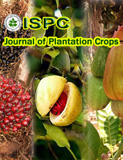Isolation and identification of bacterial strains from different tea growing areas against Macrophoma sp. in southern India tea plantation
DOI:
https://doi.org/10.25081/jpc.2018.v46.i3.5790Abstract
Branch canker is an important secondary stem disease in tea caused by Macrophoma theicola. Three different Macrophoma spp. were identified from three tea growing regions of southern India and their identity was confirmed by 18S rRNA method. Bacterial biocontrol isolated from four different locations of south India were also identified through 16S rRNA method. The bacterial strains were identified and evaluated for their antagonistic potential for the control of branch canker. Dual plate technique revealed that among the four bacterial strains, Bacillus amyloliquefaciens (78.9±0.4) showed maximum level of antagonism against all the three strains of Macrophoma spp. followed by B. subtilis (72.9±0.6) and B. licheniformis (64.2±0.7). In culture filtrate studies also, B. amyloliquefaciens (80.2) was found to possess highest antagonistic activity against the test pathogen, followed by B. subtilis (74.8) and Pseudomonas fluorescens (69.0). Among these, one potent strain of B. amyloliquefaciens was taken for GC-MS study and their bioactive compounds were identified as 1H-indene, 1-methylene, 3-hexadecene (Z), benzene acetic acid, phenol, and caffeine. These compounds could be responsible for antifungal activity against branch canker pathogen.







 .
.